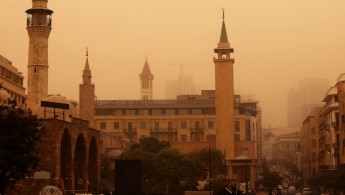Sandstorm sweeping region kills two in Lebanon
Two people have died in Lebanon and hundreds been treated for respiratory problems as a massive sandstorm blankets much of the Middle East, with authorities on high alert.
2 min read
A sandstorm hits the Lebanese capital Beirut [AFP/Getty Images]
Two people have died in Lebanon and hundreds been treated for respiratory problems as a massive sandstorm blankets much of the Middle East, Lebanon's health ministry said Tuesday.
In a statement, the health ministry said two women had died at hospitals in the Bekaa Valley region because of the storm.
"The number of cases of choking and shortness of breath caused by the sandstorm has risen to 750," the ministry said.
Both Lebanon's health ministry and the Red Cross said they were on alert as a cloud of dust and grit engulfed the country and most of its neighbours.
Health Minister Wael Abu Faour is to hold an emergency meeting on the storm's effects later Tuesday.
The health ministry urged "people suffering from asthma, allergies, cardiovascular and pulmonary problems, as well as the elderly and pregnant women, to stay at home to avoid the dust."
Lebanon's weather service said the storm was expected to abate from Wednesday night.
The storm was felt particularly in Lebanon's dozens of informal camps hosting Syrian refugees.
In the Bekaa region, a woman wrapped her headscarf over her mouth as she walked by a makeshift tent in one camp.
Lebanon is hosting more than 1.1 million Syrian refugees, many of whom live in flimsy tents in informal campsites.
Mouin Hamzeh, secretary general of Lebanon's governmental National Council for Scientific Research, said satellite images suggested the sandstorm originated in Iraq.
"It usually happens twice or even three times a year in Lebanon but during spring, March and April, and the unusual thing today is the density of the storm," he told AFP.
Furthermore, people in Lebanon have been warned against burning trash that has piled up on Beirut streets this summer, sparking a political crisis and protests.
In Syria, the storm reached the capital Damascus.
The pro-government Syrian al-Watan newspaper said it has forced the government to halt its airstrikes against rebel fighters north of the central province of Hama.
In a statement, the health ministry said two women had died at hospitals in the Bekaa Valley region because of the storm.
"The number of cases of choking and shortness of breath caused by the sandstorm has risen to 750," the ministry said.
Both Lebanon's health ministry and the Red Cross said they were on alert as a cloud of dust and grit engulfed the country and most of its neighbours.
Health Minister Wael Abu Faour is to hold an emergency meeting on the storm's effects later Tuesday.
The health ministry urged "people suffering from asthma, allergies, cardiovascular and pulmonary problems, as well as the elderly and pregnant women, to stay at home to avoid the dust."
Lebanon's weather service said the storm was expected to abate from Wednesday night.
The storm was felt particularly in Lebanon's dozens of informal camps hosting Syrian refugees.
In the Bekaa region, a woman wrapped her headscarf over her mouth as she walked by a makeshift tent in one camp.
Lebanon is hosting more than 1.1 million Syrian refugees, many of whom live in flimsy tents in informal campsites.
Mouin Hamzeh, secretary general of Lebanon's governmental National Council for Scientific Research, said satellite images suggested the sandstorm originated in Iraq.
"It usually happens twice or even three times a year in Lebanon but during spring, March and April, and the unusual thing today is the density of the storm," he told AFP.
Furthermore, people in Lebanon have been warned against burning trash that has piled up on Beirut streets this summer, sparking a political crisis and protests.
In Syria, the storm reached the capital Damascus.
The pro-government Syrian al-Watan newspaper said it has forced the government to halt its airstrikes against rebel fighters north of the central province of Hama.





 Follow the Middle East's top stories in English at The New Arab on Google News
Follow the Middle East's top stories in English at The New Arab on Google News
![Netanyahu furiously denounced the ICC [Getty]](/sites/default/files/styles/image_330x185/public/2024-11/GettyImages-2169352575.jpg?h=199d8c1f&itok=-vRiruf5)
![Both Hamas and the Palestinian Authority welcomed the ICC arrest warrants [Getty]](/sites/default/files/styles/image_330x185/public/2024-11/GettyImages-2178351173.jpg?h=199d8c1f&itok=TV858iVg)
